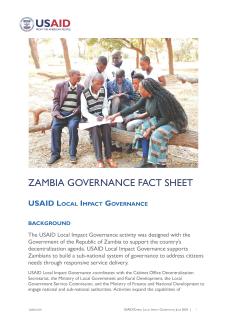The USAID Local Impact Governance activity was designed with the Government of the Republic of Zambia to support the country’s decentralization agenda. USAID Local Impact Governance supports Zambians to build a sub-national system of governance to address citizens needs through responsive service delivery.
USAID Local Impact Governance coordinates with the Cabinet Office Decentralization Secretariat, the Ministry of Local Government and Rural Development, the Local Government Service Commission, and the Ministry of Finance and National Development to engage national and sub-national authorities. Activities expand the capabilities of district-level governance bodies to increase citizen and private-sector involvement in development planning and monitoring, improve public financial management and domestic revenue generation, and to deliver sustainable development outcomes.
GOALS
GOAL ONE
Citizens improve their collective skills to effectively assess service delivery needs and performance and constructively engage with the government.
GOAL TWO
The subnational governance system becomes more responsive to citizen needs, generates and accountably expends revenue, and improves service delivery outcomes.
GOAL THREE
The program generates learning and facilitates problem solving for subnational governance systems for devolved services capable of national scale.
KEY RESULTS FOR 2023
- Over 3,600 citizens participated in ward or district-level participatory planning, budgeting, and local decision-making processes.
- Equipped 1,730 members of 206 Ward Development Committees to participate in the Constituency Development Fund process.
- Added over 259,000 new taxpayers to revenue databases of 25 local authorities in Muchinga, Central and Eastern Province, leading to an 8% increase in local authorities’ Own Source Revenue between 2022 and 2023.
- Included about 680 projects originating from district-led local development planning processes in district budgets and plans.
- 30,950 taxpayers added to the databases in six Eastern province local authorities.
- Ward Development Committees from seven districts in Central and eight districts in Muchinga provinces working with the District Development Committee.
- Trained 60 journalists and 60 members of radio listening clubs on how to report on local government, including Constituency Development Fund issues.
- Established 60 out 116 Human Resource Management Committees at the district level by the Local Government Service Commission.
- Trained over 1,350 Government officials on anti-corruption.
|

